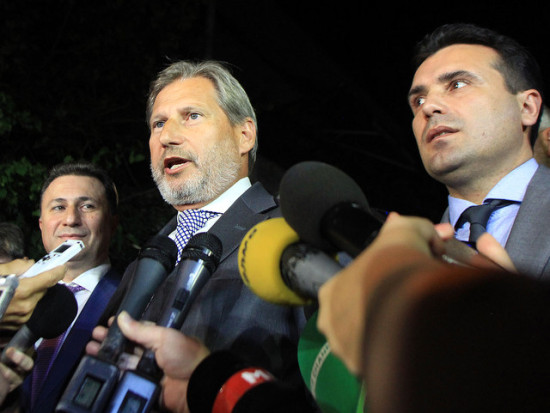EU Pushes Macedonia on New Special Prosecutor
As talks between Macedonia’s parties on appointing new special prosecutor stall, European Enlargement Commissioner Johannes Hahn has announced another visit to the country.
Commisioner Hahn’s visit comes as inter-party talks in Macedonia within the EU facilitated working group are stuck on the matter of appointing a special prosecutor to investigate illegal surveillance cases.
Hahn is due to visit Macedonia on September 18, the European Commission spokesperson, Maja Kocijancic, confirmed. Concerning the talks on the special prosecutor, she said that “work is ongoing” and that all parties need to focus on a deal “in the interest of the country and of its people”. In Skopje, Hahn is expected to resume the so-called High Level Accession Dialogue with Macedonia, HLAD – but only if there is a deal on the prosecutor. The HLAD was launched to keep Macedonia’s EU perspective alive while the country remains blocked by Greece in starting EU accession talks in a dispute concerning Macedonia’s name.Meanwhile, on Friday, former Belgian MP Peter Vanhoutte, who acts as the EU facilitator in the talks, told the parties that he is changing the format of the talks from group meetings to separate meetings with each of the four political parties. Unnamed sources from the ruling VMRO DPMNE party and from the opposition Social Democrats, the SDSM, told BIRN that this is another form of EU pressure to conclude a deal on the prosecutor by the September 15 deadline.”I expect the pressure will be on both sides, especially now when we know that Hahn is coming again,” a source from VMRO DPMNE close to the talks told BIRN.
Unofficially, VMRO DPMNE wants the appointment of only one special prosecutor. The opposition Social Democrats are demanding an entire team of prosecutors and deputies backed by other professional staff who can effectively manage the investigation of the cumbersome wiretapping materials.
“VMRO DPMNE wants to limit the power of the new prosecution and tie its hands from the start”, an SDSM official close to the talks told BIRN under condition of anonymity.
The opposition expects a deal about the new bill for special prosecutor several days before the September 15 deadline so that it can pass through parliament on time while the two sides continue discussing who should be appointed to the seat.
The inter-party talks are supposed to iron out the details about implementing a crisis deal brokered in summer by Commissioner Hahn. As part of the deal, the opposition last week returned to parliament, ending a 15-month boycott.
The political crisis in Macedonia revolves around the allegations of mass illegal surveillance. The Social Democrats say that tapes, which they have been releasing since February, show that Prime Minister Nikola Gruevski and his cousin, former secret police chief Saso Mijalkov, were behind the illegal surveillance of some 20,000 people, including government ministers.
The tapes appeared to reveal the government’s direct involvement in election fraud and abuse of the justice system and media. They suggested the Prime Minister’s involvement in illegal purchase of construction land among other wrongdoings and also suggested the authorities covered up the murder of a young man by a police officer.
Gruevski, who has been in power since 2006, has insisted that the compromising tapes in question were “created” by unnamed foreign intelligence services and given to the opposition to destabilise the country.
The crisis agreement also stipulated the appointment of new Interior and Labour ministers from the ranks of the opposition as well as the resignation of Gruevski in mid-December, 100 days before the snap elections set for April.
Other outstanding issues envisaged by the agreement include a revision of the electoral law and measures to ensure unbiased media reporting of the campaign.
BalkanInsight
9 September 2015

